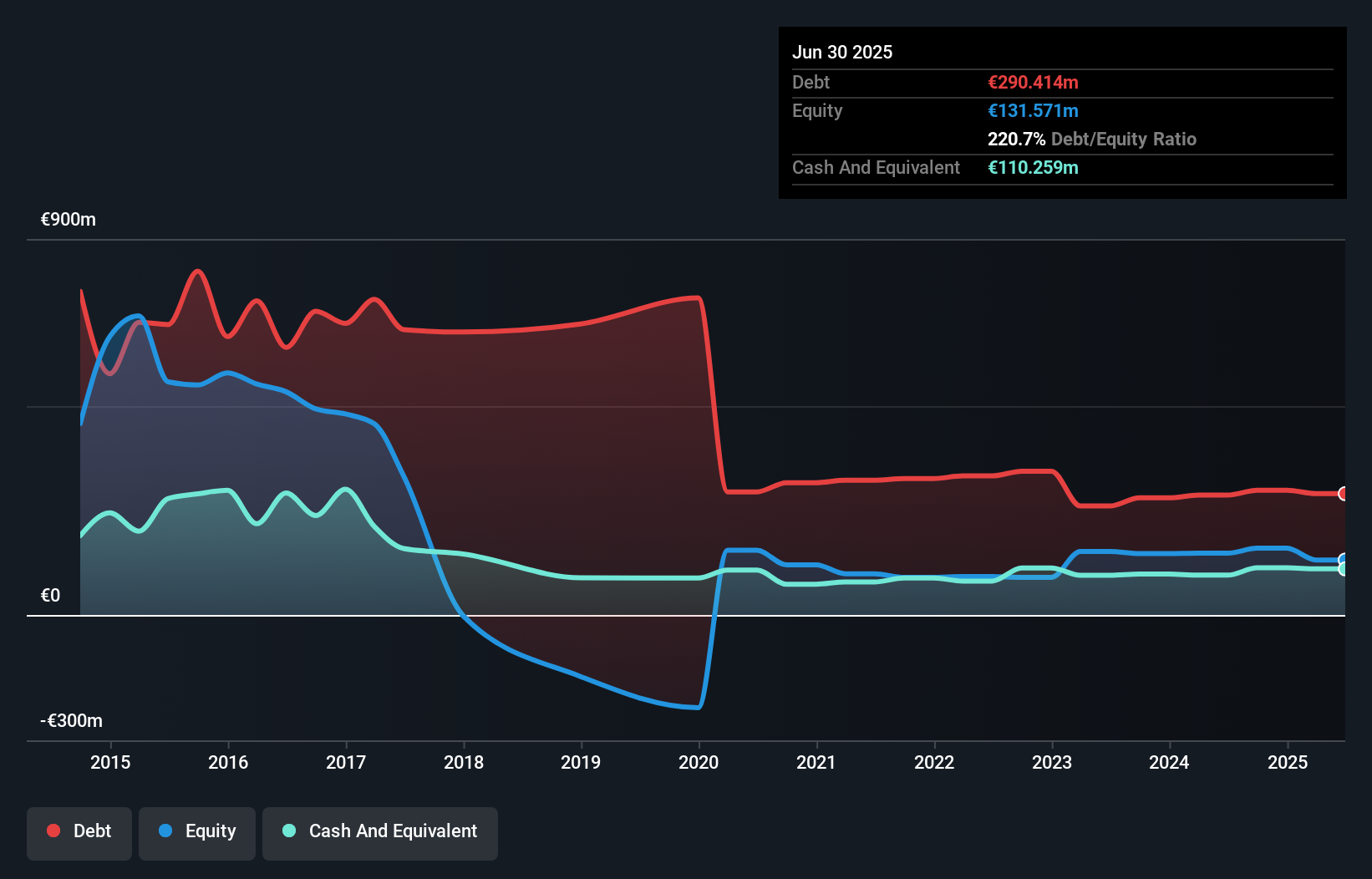Some say volatility, rather than debt, is the best way to think about risk as an investor, but Warren Buffett famously said that 'Volatility is far from synonymous with risk.' It's only natural to consider a company's balance sheet when you examine how risky it is, since debt is often involved when a business collapses. We can see that TREVI - Finanziaria Industriale S.p.A. (BIT:TFIN) does use debt in its business. But the real question is whether this debt is making the company risky.
What Risk Does Debt Bring?
Debt and other liabilities become risky for a business when it cannot easily fulfill those obligations, either with free cash flow or by raising capital at an attractive price. Part and parcel of capitalism is the process of 'creative destruction' where failed businesses are mercilessly liquidated by their bankers. While that is not too common, we often do see indebted companies permanently diluting shareholders because lenders force them to raise capital at a distressed price. Having said that, the most common situation is where a company manages its debt reasonably well - and to its own advantage. The first step when considering a company's debt levels is to consider its cash and debt together.
What Is TREVI - Finanziaria Industriale's Net Debt?
As you can see below, TREVI - Finanziaria Industriale had €290.4m of debt, at June 2025, which is about the same as the year before. You can click the chart for greater detail. However, it does have €110.3m in cash offsetting this, leading to net debt of about €180.2m.

How Strong Is TREVI - Finanziaria Industriale's Balance Sheet?
We can see from the most recent balance sheet that TREVI - Finanziaria Industriale had liabilities of €303.7m falling due within a year, and liabilities of €265.0m due beyond that. Offsetting these obligations, it had cash of €110.3m as well as receivables valued at €270.2m due within 12 months. So its liabilities outweigh the sum of its cash and (near-term) receivables by €188.2m.
When you consider that this deficiency exceeds the company's €174.9m market capitalization, you might well be inclined to review the balance sheet intently. In the scenario where the company had to clean up its balance sheet quickly, it seems likely shareholders would suffer extensive dilution.
View our latest analysis for TREVI - Finanziaria Industriale
We use two main ratios to inform us about debt levels relative to earnings. The first is net debt divided by earnings before interest, tax, depreciation, and amortization (EBITDA), while the second is how many times its earnings before interest and tax (EBIT) covers its interest expense (or its interest cover, for short). This way, we consider both the absolute quantum of the debt, as well as the interest rates paid on it.
TREVI - Finanziaria Industriale's net debt is sitting at a very reasonable 2.0 times its EBITDA, while its EBIT covered its interest expense just 4.4 times last year. While that doesn't worry us too much, it does suggest the interest payments are somewhat of a burden. Notably, TREVI - Finanziaria Industriale's EBIT launched higher than Elon Musk, gaining a whopping 119% on last year. There's no doubt that we learn most about debt from the balance sheet. But ultimately the future profitability of the business will decide if TREVI - Finanziaria Industriale can strengthen its balance sheet over time. So if you're focused on the future you can check out this free report showing analyst profit forecasts.
Finally, a company can only pay off debt with cold hard cash, not accounting profits. So we always check how much of that EBIT is translated into free cash flow. Happily for any shareholders, TREVI - Finanziaria Industriale actually produced more free cash flow than EBIT over the last three years. There's nothing better than incoming cash when it comes to staying in your lenders' good graces.
Our View
Both TREVI - Finanziaria Industriale's ability to to convert EBIT to free cash flow and its EBIT growth rate gave us comfort that it can handle its debt. Having said that, its level of total liabilities somewhat sensitizes us to potential future risks to the balance sheet. When we consider all the elements mentioned above, it seems to us that TREVI - Finanziaria Industriale is managing its debt quite well. Having said that, the load is sufficiently heavy that we would recommend any shareholders keep a close eye on it. The balance sheet is clearly the area to focus on when you are analysing debt. But ultimately, every company can contain risks that exist outside of the balance sheet. These risks can be hard to spot. Every company has them, and we've spotted 2 warning signs for TREVI - Finanziaria Industriale (of which 1 is potentially serious!) you should know about.
If you're interested in investing in businesses that can grow profits without the burden of debt, then check out this free list of growing businesses that have net cash on the balance sheet.
Valuation is complex, but we're here to simplify it.
Discover if TREVI - Finanziaria Industriale might be undervalued or overvalued with our detailed analysis, featuring fair value estimates, potential risks, dividends, insider trades, and its financial condition.
Access Free AnalysisHave feedback on this article? Concerned about the content? Get in touch with us directly. Alternatively, email editorial-team (at) simplywallst.com.
This article by Simply Wall St is general in nature. We provide commentary based on historical data and analyst forecasts only using an unbiased methodology and our articles are not intended to be financial advice. It does not constitute a recommendation to buy or sell any stock, and does not take account of your objectives, or your financial situation. We aim to bring you long-term focused analysis driven by fundamental data. Note that our analysis may not factor in the latest price-sensitive company announcements or qualitative material. Simply Wall St has no position in any stocks mentioned.
About BIT:TFIN
Adequate balance sheet and fair value.
Market Insights
Community Narratives



